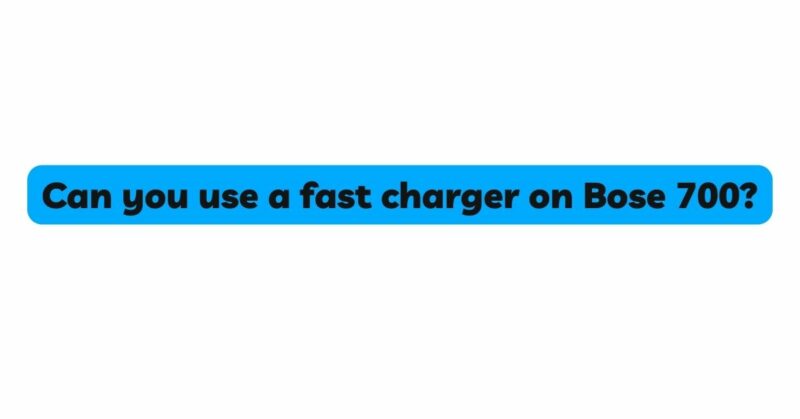The Bose 700 headphones have earned a reputation for delivering exceptional sound quality, advanced noise-canceling features, and a stylish design. As users seek efficient ways to power up their devices, questions arise about the compatibility of fast chargers with the Bose 700 headphones. In this article, we will delve into the concept of fast charging, explore its benefits and potential drawbacks, examine the compatibility of fast chargers with the Bose 700 headphones, and provide guidance on how to optimize the charging process for these premium wireless headphones.
- Understanding Fast Charging: Fast charging is a technology that accelerates the charging process of electronic devices by increasing the power output delivered to the device’s battery. This technology allows devices to charge at a faster rate compared to traditional charging methods, reducing the overall charging time significantly.
- The Charging Process for Bose 700 Headphones: The Bose 700 headphones utilize a rechargeable battery, providing the freedom to enjoy extended listening sessions wirelessly. Charging the headphones replenishes the battery, ensuring continuous use of noise-canceling features and audio playback.
- Fast Charging Compatibility with Bose 700 Headphones: As of my knowledge cutoff in September 2021, the Bose 700 headphones do not officially support fast charging. The charging process for these headphones typically requires approximately 2 to 3 hours to reach full capacity. While this information may change in the future, it is essential to verify the latest product specifications or official Bose sources for any updates related to fast charging compatibility.
- Factors Influencing Charging Time: The time it takes to charge the Bose 700 headphones is influenced by various factors:
a. Battery Level: The initial battery level affects the charging time. A depleted battery may take longer to charge than a partially drained one. b. Battery Capacity: The battery capacity of the Bose 700 headphones plays a role in determining the overall charging time. c. Charging Source: The power output of the charging source, such as a USB port or a power adapter, can impact charging speed. Higher wattage chargers typically charge the headphones faster.
- Potential Risks of Using a Fast Charger: While fast charging offers the advantage of quicker charging times, there are potential risks associated with using fast chargers with electronic devices:
a. Battery Stress: Fast charging may lead to increased heat generation, which can stress the battery and potentially degrade its overall lifespan over time. b. Reduced Battery Efficiency: Rapid charging can affect battery efficiency, leading to a decrease in the battery’s ability to hold a charge effectively. c. Device Overheating: Fast charging can cause the device to heat up, potentially leading to reduced performance or temporary shutdowns to protect the internal components.
- Official Manufacturer Recommendations: To ensure optimal performance and battery health, it is crucial to adhere to the official manufacturer’s recommendations regarding charging methods and power sources. Manufacturers often specify the maximum power output that their devices can handle, which helps users choose the appropriate charger to avoid potential risks.
- Optimizing Charging Efficiency for Bose 700 Headphones: While the Bose 700 headphones may not support fast charging, users can still optimize the charging process for efficient results:
a. Use the Provided USB-C Cable: Always use the original USB-C charging cable provided by Bose. Third-party cables may not offer the same charging efficiency or safety. b. Choose a High-Quality Power Source: Select a power adapter or a USB port with sufficient power output to charge the headphones optimally. c. Avoid Extreme Temperatures: Charging the headphones in a cool, well-ventilated environment can help optimize the charging process and protect the battery. d. Avoid Frequent Complete Discharges: Frequent complete discharges can impact battery health. Charge the headphones regularly, even if the battery is not fully depleted.
- Future Product Developments: As technology advances, manufacturers may introduce new features and enhancements in subsequent versions of their products. It is possible that future iterations of the Bose 700 headphones or other models in the Bose lineup could incorporate fast charging capabilities.
- Recommendations for Users: Until fast charging compatibility with the Bose 700 headphones is officially confirmed, it is advisable for users to follow these recommendations:
a. Stick to Regular Charging: Charge the Bose 700 headphones using the provided USB-C cable and a standard power source for the recommended charging duration. b. Check for Updates: Stay informed about product updates from Bose to be aware of any changes to charging capabilities.
Conclusion: As of my knowledge cutoff in September 2021, the Bose 700 headphones do not officially support fast charging. While fast charging offers the advantage of quicker charging times, it is essential to consider potential risks, such as battery stress and reduced efficiency. To ensure optimal performance and battery health, users should adhere to the official manufacturer’s recommendations regarding charging methods and power sources. While the Bose 700 headphones may not support fast charging, users can still optimize the charging process for efficient results by using the provided USB-C cable, choosing a high-quality power source, avoiding extreme temperatures, and avoiding frequent complete discharges. For the most up-to-date information on charging capabilities, users should refer to the latest product specifications or official Bose sources. By following these guidelines, users can enjoy uninterrupted audio experiences with their Bose 700 headphones while maintaining the long-term health of the device’s rechargeable battery.


